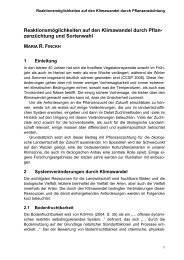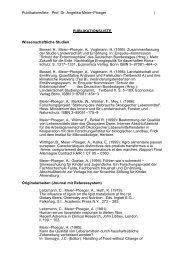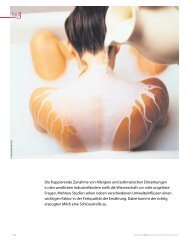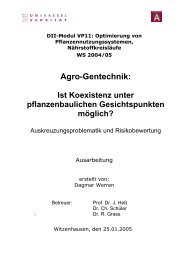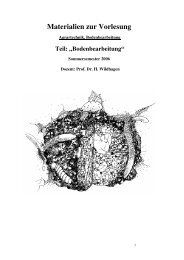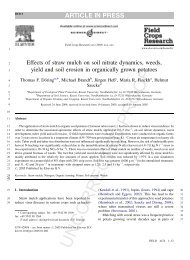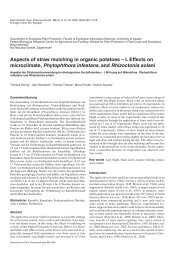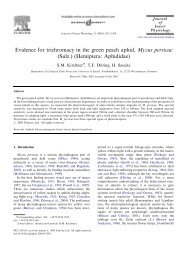You also want an ePaper? Increase the reach of your titles
YUMPU automatically turns print PDFs into web optimized ePapers that Google loves.
and another way of acting is needed, based on prevention through knowledge of ecological<br />
processes. Diseases are seen as symptoms of an unbalanced system expressed in the lack of<br />
balance between plant or animal and farm environment. Rather than fighting pests and<br />
diseases with chemicals, the emphasis shifts to control of the environment. A more diverse<br />
environment is necessary in which wild plants in hedges, borders or ditches are grown to<br />
maintain natural enemies within the farm system. Plant strength can also be increased through<br />
the right choice of manure, or by sound crop rotation. All this means that farmers start to<br />
think in a more ecological way, looking for the broader context of a problem and realising<br />
that the farm should be transformed into a complex, sustainable and balanced agro-ecosystem.<br />
Terms such as closed system, mineral cycle, self-regulation and bio-diversity are important<br />
keywords to characterise naturalness in this approach of organic agriculture. One needs to<br />
work together with nature instead of fighting against it. Solutions are based on rational,<br />
experiential and experimental ecological knowledge. Therefore the understanding of<br />
naturalness in this approach can be characterised as:<br />
• Focus on balancing the agro-ecological system based on preventive management (as an<br />
action)<br />
• Context-oriented, based on relationship knowledge in auto-ecology and syn-ecology (as<br />
the way of thinking)<br />
• Co-operating with nature<br />
• Systemic world view (as a complex hard system and its inner processes)<br />
2.3 Naturalness as a holistic meeting of the other being: entity or integrity<br />
However, Bloksma (1991) found a third approach to orient on problems in organic farming<br />
systems. The attitude is not only based on the knowledge of the agro-ecological context, but<br />
also on the inner meaning of the problem or the observed itself and the personal relationship<br />
of the farmer to the object. At first, this orientation was recognised in the field of man and<br />
animal, when the topic of integrity and entity was introduced. However, recently Lammerts<br />
van Buren (2002) introduced a view on the integrity of plants as well, when she discussed the<br />
<strong>breeding</strong> goals in organic farming.<br />
In the discussion on animal welfare a new and additional point of view was introduced which<br />
was not covered by measurable health and welfare parameters (Grommers, 1995; Visser and<br />
Verhoog, 1999; Verhoog, 2000). For instance, the mutilation of farm animals, the goals of<br />
animal <strong>breeding</strong> were not covered by the existing welfare definitions and additionally the<br />
animal was seen as ‘a being on its own’. In organic farming this way of thinking is found in<br />
terms as ‘the farm as an organism alike’ and ‘the living soil organism’. This additional<br />
element in the welfare discussion was covered by the concept of ‘animal integrity’.<br />
As said, this respect for the animal’s integrity first emerged in animal husbandry and was<br />
transformed into the concept of ‘the animal’s needs’ (Rist, 1987; Bartussek, 1991). Cattle<br />
should be fed as ruminants instead of monogastrics (Bakels and Postler, 1986; Haiger, 1989;<br />
Spengler, 1997). They should be kept as horned animals in a well-balanced herd. De-horning<br />
can only be avoided if the farmers are prepared to develop a new way of herd management,<br />
housing and feeding based on the cow’s needs (Baars and Brands, 2000; Waiblinger et al.,<br />
2000). Also the cows’ right for outdoor grazing is derived from respect for the cow’s ‘nature’.<br />
Outdoor grazing can not be replaced by an outdoor run only. This approach manifests itself<br />
among others as respect for the integrity of life, for the agro-ecosystem, and for human needs<br />
(including social and economic integrity). The term ‘natural’ here refers to taking into account<br />
the characteristic nature of plants, animals, man and ecosystem because nature has an<br />
intrinsic value. Respect for the integrity of the farm ecological system, the living soil, the<br />
3



